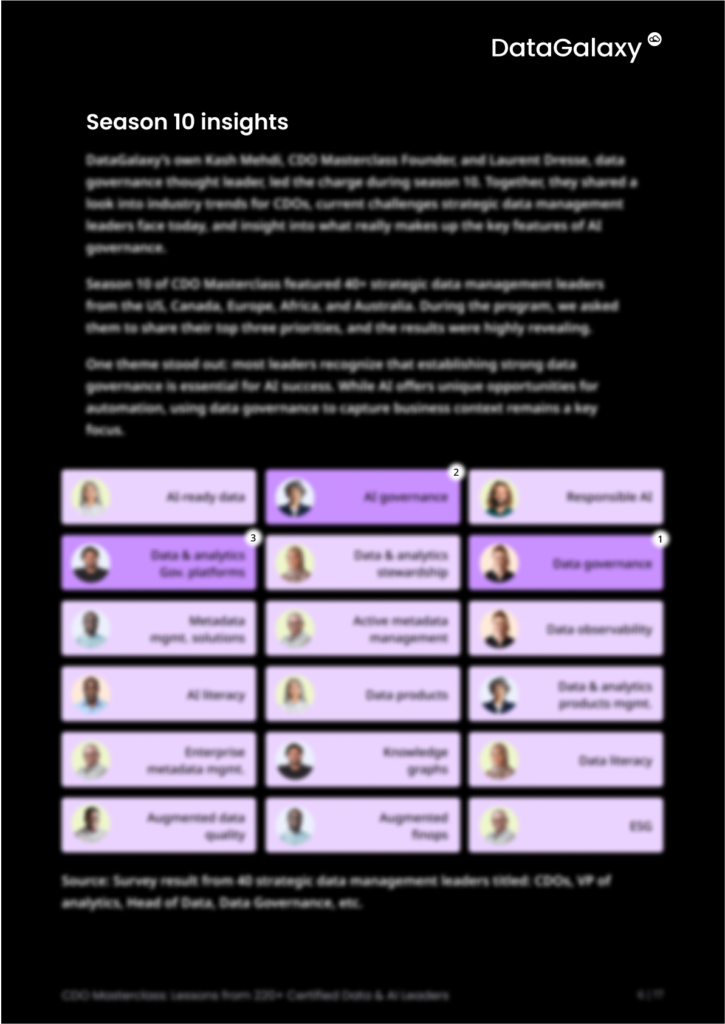
Metadata management essentials for modern data & AI governance
Finding the right information in your organization’s vast sea of data is no walk in the park.
When it comes to efficient and meaningful metadata management, you don’t have to be lost! We gathered for you the top five best practices you need to unlock your data’s power.
By following the steps listed below, you can take control of your organization’s data and use it to its full potential.
Let’s get started!
TL;DR summary
Metadata is the foundation of modern data governance, AI governance, and data product management.
As organizations scale their data and AI initiatives, metadata management ensures data remains discoverable, trusted, contextualized, and reusable.
This updated guide covers what metadata is, why it matters, how modern organizations manage it, and the best practices to help teams operationalize metadata at scale.
What is metadata?
Metadata is “data about data”. It’s the descriptive information that makes a data asset understandable and usable.
Common types of metadata include:
| Metadata Type | Description |
|---|---|
| Descriptive | Titles, descriptions, business definitions |
| Structural | How tables or datasets relate, schemas, models |
| Administrative | Access rules, file types, retention, lifecycle |
| Referential | Data lineage, upstream/downstream relationships |
| Statistical/Operational | Quality rules, freshness, usage, KPIs |
Metadata is generated continuously—whenever data is created, transformed, updated, or consumed. It provides essential context about:
- Where data comes from
- How it should be interpreted
- Who owns it
- When it was last updated
- How reliable and complete it is
This context is the backbone of data governance, AI governance, and data product management.
What is metadata management?
Metadata management is the discipline of collecting, organizing, governing, integrating, and operationalizing metadata so users can quickly find, understand, trust, and use data in meaningful ways.
In modern organizations, metadata management typically includes:
- Documenting and extracting metadata from systems, pipelines, AI models, BI tools, and APIs
- Building shared understanding between business, IT, and data teams
- Applying governance rules, such as data ownership or classifications
- Creating reusable knowledge, such as standard definitions or data products
- Ensuring compliance with frameworks like GDPR, ISO 27001, or SOC2
Historically, libraries used card catalogs to describe books—one of the earliest forms of metadata management. Today, the complexity has exploded. Organizations manage thousands of data sources, AI models, dashboards, streams, and applications.
This shift makes metadata management not just useful, but mission-critical.
Unlock the playbook of 220+ data & AI leaders
Learn the secrets shared over 10 seasons of CDO Masterclass, DataGalaxy’s premier online and in-person learning experience.
Download the white paper
Why metadata management matters
Strong metadata management unlocks significant business value.
1. Improved information access
Metadata eliminates silos and organizes disparate data sources, making it easy for teams to locate and understand the data they need.
This accelerates analytics, AI model development, and operational decision-making.
2. Enhanced data reuse across teams
Shared metadata—especially business definitions and standardized semantics—allows organizations to reuse data consistently across domains and applications.
3. Stronger organizational understanding
A unified data catalog (or data & AI product catalog) creates a common vocabulary across all teams, bridging the gap between business and technical stakeholders.
4. Higher data quality & trust
Reliable metadata reduces ambiguity, avoids inconsistent interpretations, and prevents decisions based on outdated or inaccurate information.
5. Risk reduction & compliance
Metadata supports regulatory compliance by clearly documenting:
- Data lineage
- Access rules
- Retention periods
- Classification levels
- Sensitive data indicators
Core considerations in a modern metadata management strategy
Metadata storage
Organizations must centralize metadata from all sources into a single, structured repository. This includes metadata from:
- Cloud platforms (Snowflake, Databricks, BigQuery)
- BI tools (Power BI, Tableau, Looker)
- Pipelines (Airflow, dbt)
- AI models and ML workflows
- SaaS applications and APIs
Metadata integration
Metadata must evolve as data changes.
Automated ingestion and continuous synchronization ensure metadata stays accurate and avoids the “catalog rot” common in manual systems.
Designing data & AI products that deliver business value
To truly derive value from AI, it’s not enough to just have the technology.
- Clear strategy
- Reasonable rules for managing data
- Focus on building useful data products

Metadata governance
Governance includes the roles, responsibilities, policies, and standards needed to ensure metadata remains consistent, complete, and compliant.
This often involves:
- Data Owners
- Data Stewards
- Domain Leaders
- Governance Councils
Together, these steps help organizations fully leverage their information assets—both in content and in context.
Best practices for modern metadata management
Although each company’s needs differ, the best metadata programs share several universal principles.
Set clear metadata management goals & KPIs
Metadata efforts must align with business outcomes. Use SMART goals to define success:
- Faster data discovery
- Increased reuse of data assets
- Higher quality scores
- Reduced time to insight
- Increased adoption of the catalog
Build a comprehensive data governance strategy
A governance framework provides:
- Clear business alignment
- Data quality standards
- Roles and responsibilities
- Processes and workflows
- A roadmap for value creation
Without governance, metadata initiatives become inconsistent and disconnected from organizational goals.
Create a cross-functional metadata team
A modern data organization blends:
- Business roles (Owners, Stewards, Analysts)
- Technical roles (Engineers, Architects, Platform teams)
Cross-functional teams ensure metadata is accurate, scalable, and usable.
Adopt consistent metadata standards
Metadata must be standardized to remain interpretable.
Common frameworks include:
- Dublin Core (digital resources)
- ISO 19115 (geographic data)
- ISO 27001 (security metadata & classifications)
- PRISM (publishing)
- DDI (social sciences)
Organizations should adopt standards relevant to their industries and maturity.
Find. Trust. Request. Use. Repeat.
Give business teams a dedicated space to explore, understand, and request trusted data without relying on support tickets.
Discover the marketplaceDeploy a modern metadata management platform
Modern platforms, such as DataGalaxy, provide:
- Automated metadata ingestion
- A centralized metadata repository
- Business glossaries & semantic layers
- Lineage visualization
- Data product documentation
- AI model governance
- Search & discovery features
- Collaboration workflows
Tools reduce manual effort and ensure metadata is actionable, not just documented.
The organizational benefits of strong metadata management
A well-executed metadata strategy delivers:
- Faster data discovery and onboarding
- Higher trust in analytics and AI
- Stronger documentation for regulatory compliance
- Standardized definitions and semantics
- Improved productivity
- Reduced operational risks
- Greater ability to scale AI and self-service analytics
Metadata management has become foundational to modern data and AI ecosystems. With expanding data volumes, new AI governance requirements, and decentralization across business domains, effective metadata management ensures clarity, consistency, and confidence.
Organizations that invest in structured metadata management unlock the full potential of their data—accelerating innovation, improving decision-making, and strengthening governance across the enterprise.
FAQ
- Why is metadata important?
-
Metadata explains what data means, where it comes from, and how to use it. It simplifies finding, organizing, and managing data, boosting trust, compliance, and decision-making. Like a roadmap, metadata gives teams clarity and confidence to work efficiently.
- What metadata is needed for responsible AI?
-
To support responsible AI, you need metadata that captures model lineage, training data sources, versioning, performance metrics, and ethical audit trails. This transparency is key to monitoring and governing AI at scale.
- What is DataGalaxy?
-
DataGalaxy is a modern data & AI governance platform that centralizes metadata, data lineage, and business definitions to create a shared understanding of data across the organization. Designed for collaboration, we empower teams to find, trust, and use data confidently. Learn how DataGalaxy accelerates data-driven decision-making at www.datagalaxy.com.
- How does DataGalaxy help with regulatory compliance?
-
The platform includes role-based access (RBAC), SSO, audit trails, and admin control over every object and user permission.
- How does DataGalaxy integrate with Looker?
-
DataGalaxy connects to Looker to ingest metadata from explores, views, models, and dashboards. This enables full visibility into how business users are consuming data, and brings Looker assets into the broader governance layer.
Key points
- Metadata is foundational to data quality, discoverability, and AI governance.
- Effective metadata management requires governance, automation, and cross-functional ownership.
- A modern platform like DataGalaxy accelerates adoption and value realization.
- Clear goals, standards, and roles ensure long-term success.
- Metadata management is essential for scaling data products and AI responsibly.

